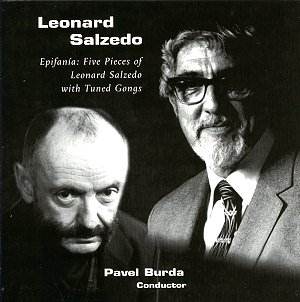Earlier this year I
reviewed the Dutton release of Salzedo’s Second and Seventh
String Quartets coupled with the Sonata for Violin and Viola
Op. 132, a disc that is undoubtedly one of my recordings of 2002. Within
the same review I lamented the disheartening lack of representation
Salzedo had in the current catalogue. Yet here, to end the year, we
are given a second helping of Salzedo in works that, with the possible
exception of the Partita that happens to be scored for percussion
and string quartet, are as far removed as they could be from the works
on the Dutton disc.
Albany give their disc the title, Epifanía:
Five Pieces of Leonard Salzedo with Tuned Gongs. The gongs in question
are a set of over two dozen chromatically tuned gongs manufactured by
Paiste and which, not surprisingly perhaps, have a sound that immediately
brings to mind the Balinese Gamelan. The origin of the works is directly
attributable to conductor Pavel Burda who commissioned them from the
composer after being entranced by the sound of the gongs, which he encountered
during a recording session with the North German Radio Symphony Orchestra
in Hamburg. It was Burda’s idea to exploit the various opportunities
afforded by the timbral integration of the gongs with differing ensembles.
Anyone who is familiar with Salzedo’s music will recognise
a number of his compositional hallmarks. These are present throughout
these works. There is a preoccupation with, at times complex syncopations,
insistent ostinato-like repeated rhythmic figurations and long stretches
of tempo in perpetual motion, a device that fascinated the composer
and crops up in many of his works. It is rhythm that is central to Salzedo’s
stylistic approach.
The most substantial work here is the Partita for
Percussion and String Quartet, a six-movement exploration of the
wide-ranging sonorities that can be drawn from this interesting, if
unusual, combination of instruments. Salzedo exploits, highly effectively,
the opportunities for textural and rhythmic variety as well as articulation
and attack, the latter notably in the second movement, Toccata,
in which the strings play pizzicato throughout. In contrast, the Notturno
features the strings in quiet sustained harmonies as percussion take
centre stage, the fifth movement, Aria, assuming the reverse
role. The final Moto Perpetuo is characteristically exciting
and breathless, gathering velocity in its dash to the conclusion. In
the same way that the Toccata concentrates on pizzicato strings,
Giuoco dei Colpi, scored for percussion, piano and double bass
(and incidentally inconsistently spelt with a double c on the booklet
cover but a single c inside) shuns sustained notes concentrating instead
on the articulation of strokes, (colpi) and interplay (giuoco). Not
a strict moto perpetuo perhaps but the tempo is more or less constant
throughout, the percussion instrumentation reliant solely on the tuned
members of the family whilst the musical material is largely drawn from
the chords heard at the outset. These are heard again at the close in
reverse order. For a work of nearly nine and a half minutes duration
with no significant changes of tempo Salzedo’s skill is considerable
in weaving a shifting "mosaic" of textural and colouristic
patterns, underpinned by the double bass, which lends a slightly jazzy
feeling to the work at certain points.
In comparison, the Sonatina for Tuned Gongs and
Piano, is a more fluid work, once again full of interesting textures
and colours but marred slightly, to my ears at least, by a strange piano
timbre not unlike that of an electric piano although we will assume
not - given that there is no reference to it in the booklet. In fact
if I have a criticism of the disc it is the fact that the acoustic qualities
of the recording seem oddly inconsistent given that all five pieces
were recorded in the same venue (Epifanía is the other
work that seems to suffer most in this respect).
Of the two works involving choir the Four Antiphones
(also know as the Four Marian Antiphons, presumably in an original
version for choir alone) is particularly affecting. This draws in part
on an old Spanish street cry (evidence here of Salzedo’s Spanish Jewish
heritage) that surfaces in the second (Ave Regina Coelorum) and
fourth (Salve Regina) pieces. For haunting beauty however, try
the Regina Caeli Laetare, disarmingly simple but wonderfully
atmospheric. Epifanía, the last work on the disc to be
written, is worlds apart in character, a celebratory cantata featuring
a prominent trumpet obbligato and setting a text by Spaniard José
de Valdivielso (1560-1638) that initially attracted the composer as
a result of its reference to drums and trumpets. Once again there are
some reservations here about the seemingly woolly acoustic although
the UW-M Concert Chorale give a gutsy, if rather unrefined, performance.
Although not for repeated listening in the same way
as the Dutton release and despite some inconsistencies in both recording
and performance, this is nonetheless an interesting disc, not to mention
a most welcome addition to the Salzedo catalogue. It is only to be hoped
that on the back of these two enterprising recent releases 2003 will
bring further interest in this deserving composer.
Christopher Thomas


